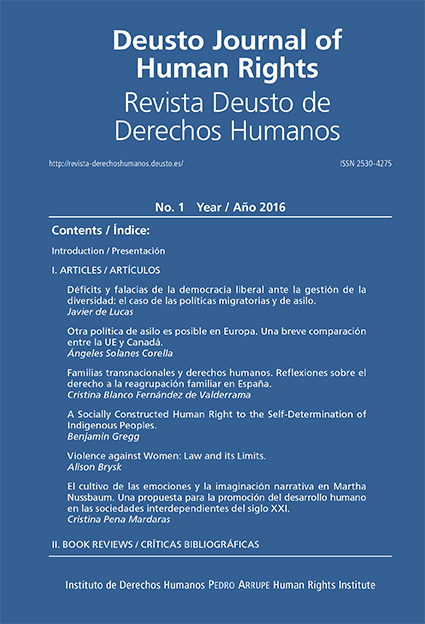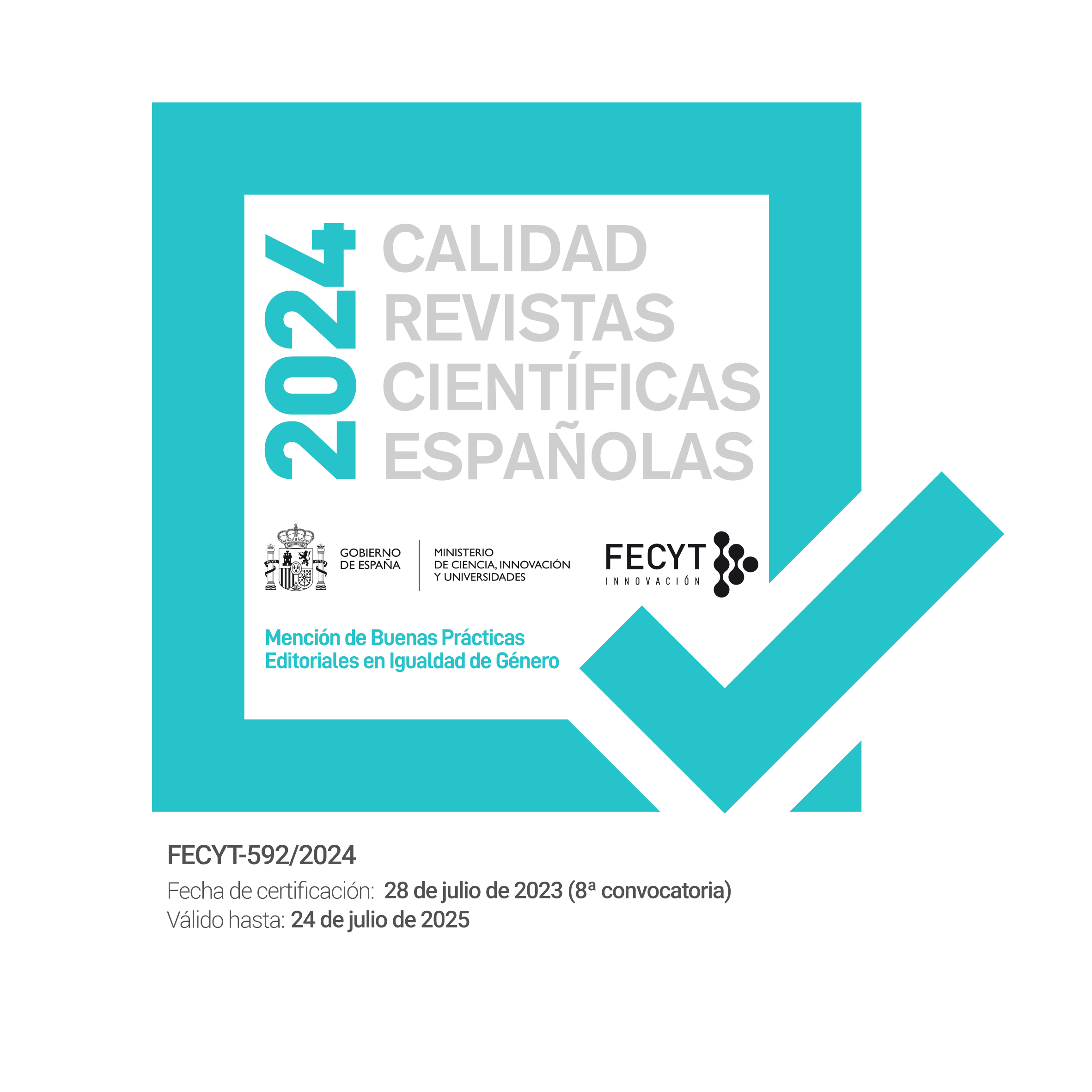Un constructo social de los Derechos Humanos para la autodeterminación de los pueblos indígenas
Resumen
Propongo un derecho humano a la autodeterminación de los pueblos indígenas como algo a desarrollar en cada caso por el pueblo indígena y válido sólo si es aceptado por ese pueblo. Es decir, abordo los derechos humanos como constructos sociales para (1) defender la construcción social de los propios pueblos indígenas, (2) con ciertos límites a los derechos indígenas a la autonomía y a la diversidad incluso cuando construyen derechos colectivos para ellos mismos; (3) logrando así la autodeterminación interna de los pueblos indígenas, mediante la cual un pueblo indígena diseñaría su propio derecho humano a la autodeterminación sin minar los derechos individuales, (4) por medio de un movimiento social y político que yo concibo como un metafórico «Estado de derechos humanos».
Recibido: 25 julio 2016
Aceptado: 30 noviembre 2016
Publicación en línea: 11 diciembre 2017
Descargas
Citas
Ahrén, Matthias. 2008. “Protecting Peoples’ Cultural Rights: A Question of Properly Understanding the Notion of States and Nations?.” In Cultural Human Rights, eds. Francesco Francioni and Martin Scheinin. Leiden: Martinus Nijhoff Publishers.
American Anthropological Association. 1947. “Statement on Human Rights,”. American Anthropologist, 49: 539-543.
American Anthropological Association. 1999. “Declaration on Anthropology and Human Rights, Committee for Human Rights, American Anthropological Association,” at http://www.aaanet.org/stmts/humanrts.htm
Anaya, S. James. 1997. “On Justifying Special Ethnic Group Rights: Comments on Pogge”. Nomos, 39: 222-231.
Anaya, S. James. 1999. “Superpower Attitudes Toward Indigenous Peoples and Group Rights”. Proceedings of the Annual Meeting (American Society of International Law), 93: 251-260.
Anaya, S. James. 2004. Indigenous Peoples in International Law, New York: Oxford University Press.
Anaya, S. James. 2009. International Human Rights and Indigenous Peoples. New York: Wolters Kluwer.
Anderson, Benedict. 1991. Imagined Communities: Reflections on the Origin and Spread of Nationalism. London: Verso.
Arneil, Barbara. 1996. John Locke and America: The Defence of English Colonialism. Oxford: Clarendon Press.
Barelli, Mauro. 2010. “The Interplay Between Global and Regional Human Rights Systems in the Construction of the Indigenous Rights Regime”. Human Rights Quarterly, 32: 951-979.
Barelli, Mauro. 2011. “Shaping Indigenous Self‑determination: Promising or Unsatisfactory Solutions?. International Community Law Review, 13: 413-436.
Bourdieu, Pierre. 1986. “La force du droit: Éléments pour une sociologie du champ juridique”. Actes de la recherche en sciences sociales, 64: 3-19.
Borja, Emiliano. 2006. “Sobre los Ordenamientos Sancionadores Originarios de Latinoamérica”, Pueblos Indígenas y Derechos Humanos, 259-264, edited by Mikel Berraondo. Bilbao: Universidad de Deusto.
Brubaker, Rogers. 2003. “Neither Individualism nor “Groupism”: A Reply to Craig Calhoun”. Ethnicities, 3: 553-557.
Cassese, Antonio. 1995. Self‑determination of Peoples: A Legal Reappraisal, Cambridge UK: Cambridge University Press.
Castellino, Joshua. 1999. “Order and Justice: National Minorities and the Right to Secession”. International Journal on Minority and Group Rights, 6: 389-415.
Charters, Claire and Rodolfo Stavehagen. 2009. “The UN Declaration on the Rights of Indigenous Peoples: How It Came to be and What it Heralds”. In Making the Declaration Work. The United Nations Declaration on the Rights of Indigenous Peoples, edited by Claire Charters and Rodolfo Stavehagen, 10-14. Copengagen: IWGIA.
Cirkovic, Elena. 2006/2007. “Self‑determination and Indigenous Peoples in International Law”. American Indian Law Review, 31: 375-399.
Daes, Erica-Irene. 2009. “The Contribution of the Working Group on Indigenous Populations to the Genesis and Evolution and the UN Declaration on the Rights of Indigenous Peoples”. In Making the Declaration Work. The United Nations Declaration on the Rights of Indigenous Peoples, edited by Claire Charters and Rodolfo Stavehagen, 48-76. Copenhagen: IWGIA.
Eagleton, Terry. 2000. The Idea of Culture. Oxford: Blackwell.
Eide, Asbjørn. 2009. “The Indigenous Peoples, the Working Group on Indigenous Populations and the Adoption of the UN Declaration of the Rights of Indigenous Peoples”. In Making the Declaration Work. The United Nations Declaration on the Rights of Indigenous Peoples, edited by Claire Charters and Rodolfo Stavehagen, 32-46. Copenhagen: IWGIA.
Errico, Stefania. 2007. “The UN Declaration on the Rights of Indigenous Peoples is Adopted: An Overview”. Human Rights Law Review, 7: 756-759.
Gilbert, Jerémie. 2006. Indigenous Peoples’ Land Rights under International Law: From Victims to Actors. Ardsley, NY: Transactional Publishers.
Gregg, Benjamin. 2002. “Proceduralism Reconceived: Political Conflict Resolution under Conditions of Moral Pluralism”. Theory and Society, 31: 741-776.
Gregg, Benjamin. 2003a. Coping in Politics with Indeterminate Norms. Albany: State University of New York Press.
Gregg, Benjamin. 2003b. Thick Moralities, Thin Politics. Durham: Duke University Press.
Gregg, Benjamin. 2012. Human Rights as Social Construction. New York: Cambridge University Press.
Gregg, Benjamin. 2016a. The Human Rights State: Justice Within and Beyond Sovereign Nations. Philadelphia: University of Pennsylvania Press.
Gregg, Benjamin. 2016b. “Human Rights as Metaphor for Political Community Beyond the Nation State”. Critical Sociology, 42: 897-917.
Gómez Isa, Felipe. 2014. “Cultural Diversity, Legal Pluralism, and Human Rights from an Indigenous Perspective: The Approach by the Colombian Constitutional Court and the Inter-American Court of Human Rights”. Human Rights Quarterly, 36: 723-756.
Gurmendi Dunkelberg, Alosno (2015) “Their Way of Punishing”: Corporal Punishment by Indigenous Peoples and the Prohibition of Torture’. Netherlands Quarterly of Human Rights, Issue 4, at http://ssrn.com/abstract=2499246, pp. 1-26.
International Labour Organization (n.d.) “Indigenous and Tribal Peoples”, at http://www.ilo.org/global/topics/indigenous-tribal/lang-en/index.htm
Kenrick, Justin and Jerome Lewis. 2004. “Indigenous Peoples” Rights and the Politics of the Term “Indigenous,”. Anthropology Today, 20: 4-9.
Kymlicka, Will. 1998. “Human Rights and Ethnocultural Justice,”, Revue d’études constitutionnelles, 4: 213-237.
Kymlicka, Will. 1999. “Theorizing Indigenous Rights,”. University of Toronto Law Journal, 49: 281-293.
Macklem, Patrick. 2009. “Recent Books on Human Rights and Groups”, International Journal on Minority and Group Rights, 16: 481-501.
Magnarella, P.J.1991. “Justice in a Culturally Pluralistic Society: The Cultural Defense on Trial”. Journal of Ethnic Studies, 19: 65-84.
Martínez Bringas, Asier. 2003. “Los Pueblos Indígenas y el Discurso de los Derechos”. Cuadernos Deusto de Derechos Humanos, 24, Bilbao: Universidad de Deusto.
Morgan, Rhiannon. 2007. “On Political Institutions and Social Movement Dynamics: The Case of the United Nations and the Global Indigenous Movement”. International Political Science Review, 28: 273-292.
Nelson, Robert. 2009. Germans, Poland, and Colonial Expansion to the East. London: Palgrave Macmillan.
Niezen, Ronald. 2003. The Origins of Indigenism: Human Rights and the Politics of Identity. Berkley: University of California Press.
Note. 1986. “The Cultural Defense in the Criminal Law”. Harvard Law Review, 99: 1293-1311.
Oldham, Paul and Miriam Anne Frank. 2008. “‘We the Peoples...’ the United Nations Declaration on the Rights of Indigenous Peoples”. Anthropology Today, 24: 5-9.
Quane, Helen. 2005. “The Rights of Indigenous Peoples and the Development Process”. Human Rights Quarterly 27, 652-682.
Scheinin, Martin. 2005. “What are Indigenous Peoples?” In Minorities, Peoples and Self‑determination, edited by Nazila Ghanea and Alexandra Xanthaki. Leiden: Martinus Nijhoff.
Searle, John. 2010. Making the Social World: The Structure of Human Civilization, Oxford: Oxford University Press.
Stamatopoulou, Elsa. 1994. “Indigenous Peoples and the United Nations: Human Rights as a Developing Dynamic”, Human Rights Quarterly, 16: 58-81.
Stavenhagen, Rodolfo. 2015. “Indigenous Peoples’ Rights to Education”. European Journal of Education, 50: 254-257.
Thornberry, Patrick. 2002. Indigenous Peoples and Human Rights. Manchester: Manchester University Press.
Van Broeck, Joroen. 2001. “Cultural Defence and Culturally Motivated Crimes (Cultural Offences)”. European Journal of Crime, Criminal Law and Criminal Justice, 9: 1-32.
Xanthaki, Alexandra. 2007. Indigenous Rights and United Nations Standards. New York: Cambridge University Press.
Deusto Journal of Human Rights / Revista Deusto de Derechos Humanos es una revista de Acceso Abierto; lo que significa que es de libre acceso en su integridad inmediatamente después de la publicación de cada número. Se permite su lectura, la búsqueda, descarga, distribución y reutilización en cualquier tipo de soporte sólo para fines no comerciales y según lo previsto por la ley; sin la previa autorización de la Editorial (Universidad de Deusto) o la persona autora, siempre que la obra original sea debidamente citada (número, año, páginas y DOI si procede) y cualquier cambio en el original esté claramente indicado. Cualquier otro uso de su contenido en cualquier medio o formato, ahora conocido o desarrollado en el futuro, requiere el permiso previo por escrito de la persona titular de los derechos de autoría.



3.jpg)
3.jpg)
3.jpg)
.jpg)








